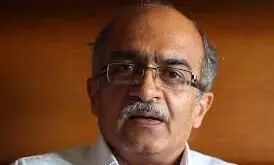
The case is lost; the argument wins
text_fieldsA Supreme Court verdict issued on the eve of Independence Day has occasioned new debates about freedom of opinion and the judiciary's style of functioning. The three-judge bench found senior lawyer Prashant Bhushan guilty of criminal contempt of court for his two tweets, remarking that Bhushan's comments tended to scandalise the court. Bhushan's tweet of 29 June showed the picture of chief justice SA Bobde sitting on a luxury bike with the remarks that he was mounted on a BJP leader's bike without wearing helmet and mask and this happened when the the Supreme Court was in lockdown denying common man the opportunity to demand justice. There was another tweet on 27 June which said that "when historians in future look back at the last 6 years to see how democracy has been destroyed in India even without a formal Emergency, they will particularly mark the role of the Supreme Court in this destruction, and more particularly the role of the last 4 CJIs". The bench led by Justice Arun Mishra which delivered the judgement said the said tweets amounted to contempt. The sentence is to be delivered on 20 August.
If the conviction and sentence will raise the prestige of the judiciary, that would be justifiable. But even jurists who view the judiciary with reverence opine that the effect will be just the opposite. Among them there are those who said that intolerance towards expression of free opinion will be against the constitution. Judges and the judiciary are not infallible. And the people who are sovereign have the right to point out and criticise the errors made by them. The very manner in which the highest court handled this case is being subjected to adverse debates. Among the noticeable aspects highlighted are its inappropriate haste, extraordinary procedural path, denial of natural justice, and a distortion of priorities. In short, this verdict has come as one that symbolises all the shortfalls of the judiciary which Prashant Bhushan pointed at through his tweets. As former chief justice Gajendragadkar had commented long ago, respect is not one to be grabbed but to be earned through the merit of judgements.
There is a big body of judicial opinion that the contempt of law which will not brook even well-meaning criticism, is outdated. In Britain, which India has modelled on for most of its jurisprudence, the provision of criminal contempt law is no more in force. In the absence of universally agreed criteria, contempt of court is a perpetual threat against the fundamental right to freedom of expression. The main reproach against the latest judgement is also that it will deter constructive dissent and public debate. Modern legal forums argue that the contempt of court law itself is unacceptable, as it negates Article 19 (1) A of the Constitution.
And are the very procedures followed in this case free from faults? An individual named Mehek Maheswari files a petition alleging Prashant Bhushan is guilty of contempt of court. Even in disregard of the precedent that it should be supported by the consent or knowledge of the Attorney General, the petition gets accepted. The petition that should have been received by the chief justice goes to Justice Arun Mishra through the registry and becomes a suo motu case by the court. It is taken for trial with unusual haste, and in the bench of Arun Mishra himself. Prashant Bhushan's objection that Mishra was prejudiced against him, is not considered. And Bhushan's letter written on 25 July to the chief minister explaining this position of his, also fails to be considered. Another case of contempt filed against Bhushan in 2009 is dug out. A principle which is also bypassed is that if action has to be taken on personal slander against judges, it is upto the respective judges to file a defamation case, and the institution of judiciary is not to be used.
Legal experts also bring it to attention that there is lack of logic and contradiction in the verdict. Prashant Bhushan did not do anything different from the step of four Supreme Court judges holding a press conference in 2018 about the conduct of business of the apex court. Judges of the same court and political leaders have highlighted that in the matter of assigning cases to different benches and in the constitution of benches itself, serious irregularities were being committed. None of this was intended to bring disrepute to the court; instead they constituted an exercise of the people's right to flag shortfalls. And what critics including Bhushan, who hold a mirror on the judiciary, do is to correct the court and to help it regain its prestige. The people have serious complaints about acts that do not help raise the esteem of the courts such as: unjustifiable transfers, a judge himself sitting in judgment on a case of sexual abuse charges against him, lax handling of complaints against violation of civil rights and habeas corpus petitions. There are also complaints that when the government misleads the court, the latter fails to hold the former to account. When those who point out that all these serve to wreck the credibility, are in fact the judiciary's well-wishers. Wouldn't it have been a better course for the court to rectify the mistakes cited by Prashant Bhushan including on the court's prioritites? Prashant Bhushan has lost his case through the court's judgement, but his contention has won.























